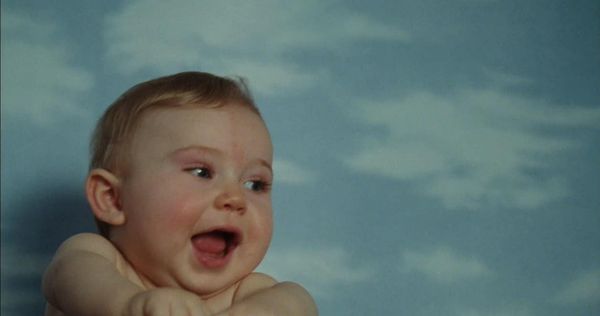Eye For Film >> Movies >> Ricky (2009) Film Review
Ricky
Reviewed by: Adam Micklethwaite

Based on a short story by Rose Tremain, this magical-realist fable is an intriguing and charming, if at times somewhat paradoxical, effort from experienced French director Francois Ozon. Ricky is a tale of striking contradictions, beginning as a kitchen-sink drama, which centres on the love affair between two ordinary people, before transforming into an altogether different animal, shifting focus towards the extraordinary child resulting from their union.
With a storyline which wouldn’t be out of place in a Sixties Disney film, this is certainly an unusual choice for French auteur François Ozon, but unsurprisingly his interest is not so much in the ‘extraordinary’ for its own sake, but rather for the way in which the extraordinary interacts with and impacts upon the ordinary and everyday.

The first half of the film plays like a kitchen sink drama, as Ozon’s trademark naturalism tracks the blossoming of a relationship between Paco (Sergi Lopez) and Katie (Alexandra Lamy), two workers at a cosmetics factory in the industrial heart of northern France. Somewhat slow to reach its stride, this is a nevertheless a touching analysis of the blossoming relationship, which finds the director very much on home soil. He dissects the impact of the love affair upon Katie’s relationship with her daughter Lisa (a convincing and very mature performance from Mélusine Mayance) before demonstrating how Ricky’s birth affects the fragile balance of the family unit.
Then, one day, something truly extraordinary begins to happen to Ricky, and the family’s world is irrevocably changed. Ricky’s transformation leads to a rift between Paco and Katie before attracting the interest of the outside world in a scene which is blatant critique of the media circus and its impact upon the lives of ordinary people. Ozon uses the juxtaposition of the ordinary and the extraordinary to create a weird mix of the comedic and the unsettling. Many of the incidents involving Ricky are touching and funny, but at the same time it is no coincidence that sections of the score have echoes of Rosemary’s Baby.
Ozon seeks to maintain the mystery and suspense of the twist even once it has been revealed, leaving the audience with a vague sensation of impending crisis, even when there is apparently nothing to fear. The crisis, when it does arrive, is typically understated and unexpected, as the director sensibly avoids the temptation towards melodrama, which could have ruined the film. Likewise the ending is handled adeptly, being at once suitably ambiguous and suitably gratifying as to remain open-ended but also offer a sense of closure to this urban fable.
Although Ozon never quite makes his mind up about the tone of the piece, the weird juxtaposition of the normal and abnormal is mostly effective, backed up by some heart-warming comedy and fine performances from the leads. The film’s greatest weakness, however, is its somewhat cumbersome and lengthy first half which precedes the introduction of the child and makes it difficult to escape the impression that Ozon is no more at ease with baby Ricky than the doctors who unsucessfully try to examine him.
Reviewed on: 01 Mar 2009














